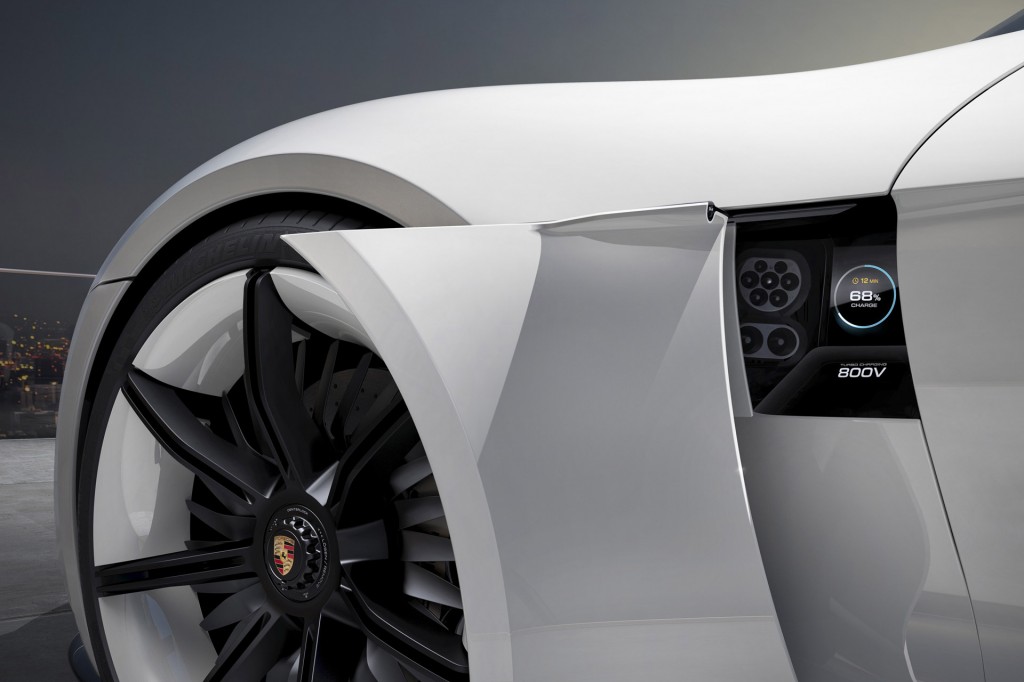Possibly no German carmaker was more shocked by the emergence of the Tesla Model S in 2012 than Porsche.
Each of Porsche's models was a top performer in its segment for power, handling, and features, and sold at highly profitable prices.
Then came the Tesla Model S, a five-seat hatchback sedan that offered striking looks and stunning performance in its top-end versions, soon accompanied by the Supercharger fast-charging network that now blankets the U.S.
DON'T MISS: Porsche Mission E electric sedan to offer 300 miles of range, 400 hp, at minimum
Porsche's understanding of that car's capabilities, from a competitor that hadn't existed just 10 years before, shook the company to its core.
The result of that "Tesla shock" is the Porsche Mission E, which will go into production late next year as a 2020 model.
And taking a lesson from the Tesla playbook, it will be accompanied by fast charging for road trips at a rate not previously offered in production cars.

Porsche Mission E concept, 2015 Frankfurt Auto Show
A lengthy interview with Uwe Michaels, the head of Porsche's electrics and electronics development division, was published last Tuesday and contains new details about the company's thinking and the future car's features.
The interview was produced by the company's public-relations team, so it can be viewed as advance product marketing—but it offers several points electric-car fans and advocates may find worth absorbing.
One main differentiator for the Mission E will be what Porsche calls "Turbo Charging," ultra-fast charging that delivers 800 volts of electricity to the battery pack at up to 350 kilowatts.
CHECK OUT: Not just Porsche: Honda wants 15-minute fast charges for electric cars too
That will requires entirely new technology for charging stations, including liquid-cooled charging cables, but Michaels notes the higher voltage actually reduces the weight of certain onboard components in the electric car.
Other points from the interview:
- Porsche's goal for "Turbo Charging" is a battery recharge of 400 km (250 miles) in less than 20 minutes, which Michaels says its customers want and expect
- Those high-voltage charging stations on highways will include built-in battery storage for peak power delivery, and can modulate the electricity delivered to multiple vehicles plugged in at the same time
![Total charging time required for 250-mile (400-km) trip at various charging rates [graphic: Porsche] Total charging time required for 250-mile (400-km) trip at various charging rates [graphic: Porsche]](https://images.hgmsites.net/lrg/total-charging-time-required-for-250-mile-400-km-trip-at-various-charging-rates-graphic-porsche_100579151_l.jpg)
Total charging time required for 250-mile (400-km) trip at various charging rates [graphic: Porsche]
- Its electric cars will plan routes and charging stops to minimize the time spent off the road (as Tesla does today)
- One single international plug standard for 800-volt charging will be used worldwide (we remain to be convinced China will fall in line with this plan, however)
- Porsche will offer "intelligent" home charging stations that can be programmed to charge at cheaper times and vary the charging: 3.6 or 7.2 kw for plug-in hybrids, 11 or 22 kw for battery-electric vehicles
- All VW Group brands are working together on inductive charging, but Michaels sees that as limited to home use in the near and medium term
- The company is working with battery-cell suppliers LG Chem and Panasonic to develop customized cells and battery packs, because "off-the-shelf procurement is simply not an option for Porsche"
- It projects performance improvements in traditional lithium-ion cells of 5 percent a year ...
- ... but doesn't expect workable solid-state cells until 2025, which it's working on with partner Quantumscape (Toyota is said to be planning to launch them in electric cars as early as 2022)

Porsche Mission E concept, 2015 Frankfurt Auto Show
- It doesn't expect lithium-air batteries in production vehicles until 2030
- Level 5 autonomy for vehicles—in which the car drives itself under all circumstances, while occupants can even go to sleep if desired—is not a priority for Porsche, because its customers like to drive
- What U.S. planners sometimes call "Prius clusters" (neighborhoods with lots of advanced-technology vehicles) are apparently known in German as "dentist streets"
WATCH THIS: Porsche Mission E electric car concept design video (Apr 2016)
These are just the high points, and we'd suggest the interview is worth reading in full.
Meanwhile, we expect Porsche to release more details on the production version of the Mission E that will launch in less than 24 months.
We may hear more about the car at the Geneva Motor Show, where media days will be held March 5 through March 7.













